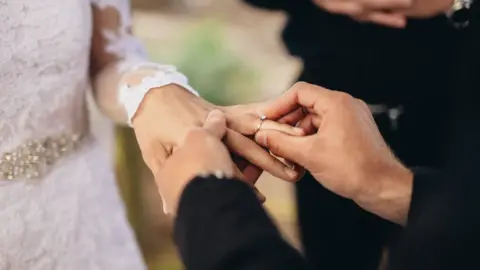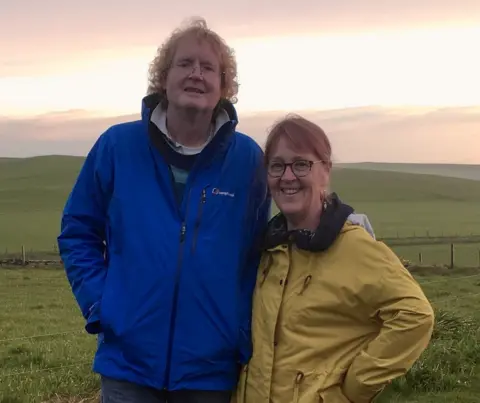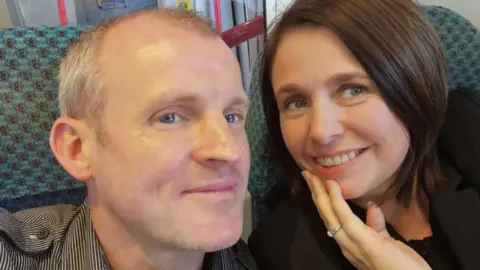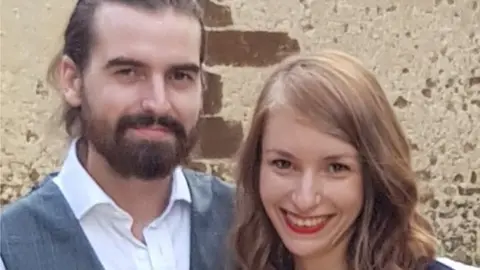Humanist weddings: Landmark High Court challenge to legally recognise marriages
 Getty Images
Getty ImagesSix couples are taking a landmark challenge to the High Court next week in a bid to get legal recognition for humanist weddings in England and Wales.
Currently, humanist ceremonies are not recognised in law, so couples must also have a civil ceremony.
Lawyers for the six couples say the current law discriminates against them because of their humanist beliefs.
In Scotland and Northern Ireland, the law is different and humanist ceremonies are legally recognised.
Humanist weddings are non-religious ceremonies which are conducted by a humanist celebrant.
Currently in England and Wales, non-religious weddings are only legal if they are carried out by a registrar.
But humanist weddings became legal in Scotland in 2005 and in Northern Ireland in 2018, and since then the number of couples opting for such weddings in both nations has soared.
The legal challenge to ask the UK government to change the law was lodged at the High Court last November, and will be heard on 7 and 8 July.
It is being supported by the charity Humanists UK, which has campaigned on the issue for decades.
The organisation says a change in law could help deal with "the huge backlog" of demand for marriage services due to the pandemic.
"Couples who have humanist weddings see that day as the epitome of their love and commitment to each other, and all they want is the same legal recognition for that as is given to every religious person in our country," said the head of Humanists UK, Andrew Copson.
"We have tried for decades to address this glaring double standard. Government has dragged its heels and that's why it's been left to these couples to bring this case."
The Ministry of Justice said it wants to "give couples more choice in how they celebrate their commitment to each other" and has asked for a review from the Law Commission to make recommendations "for a simple, fair and consistent system for all".

The couples
"We believe that the act of getting married is profoundly personal and having a humanist ceremony is central to our identities as humanists," said Kate Harrison and Christopher Sanderson from Lincolnshire.
 Humanists UK
Humanists UKThe retired couple have been together for 14 years and are in their sixties, and say they will not get married until humanist marriages are recognised.
"It is highly discriminatory that if you have a religion you can get married in a way of your choosing which is compatible with your beliefs, but if you are non-religious, the state has a complete monopoly over how you get married," they said.
Meanwhile, Jennifer McCalmont and Finbar Graham from Carrickfergus in Northern Ireland, said: "We come from two separate religious backgrounds which neither of us practises and so we didn't want to be hypocritical in having a religious ceremony."
 Humanists UK
Humanists UK"Living in Northern Ireland we could simply have a legally recognised humanist marriage here but Northam Beach in Devon is special to us as it was the first place we holidayed together.
"Not being able to have the ceremony we want will undoubtedly undermine the significance of the day and devalue our beliefs. The current law discriminates against us as humanists."
Meanwhile, Victoria Hosegood and Charli Janeway from Kent have postponed their wedding until next year due to the coronavirus pandemic but intend to have a humanist ceremony.
 Humanists UK
Humanists UK"Marriage laws need to reflect the make-up of modern-day society, including the growing numbers of humanists, which is why we think this case is so important," they said.

Ciaran Moynagh, a solicitor representing some of the claimants, suggested "momentum is on our side" following the law change in Northern Ireland in 2018.
Tory MP Crispin Blunt, who chairs the all-party Parliamentary Humanist Group, said it was "understandable" that the six couples had "given up waiting" and chosen the legal route.
"The government has been considering bringing about legal recognition of humanist marriages for some seven years now, over three different reviews."
Labour's faith and belief spokeswoman, shadow minister Janet Daby, said: "It's time for the government to recognise the thousands of humanists across the country who are simply asking for a legally recognised wedding that is reflective of their beliefs and values."
Humanists UK say more than 1,000 couples a year already have a humanist ceremony and then must have a separate civil marriage - usually at a registrar's office - for it to be legally recognised.
